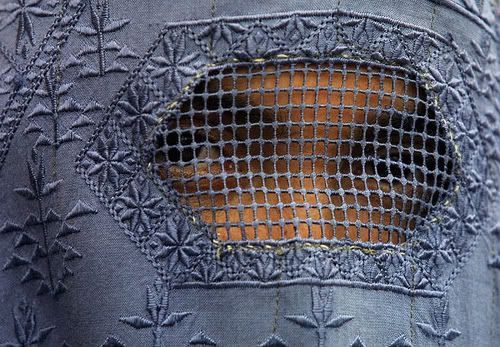Like everyone else, I was stunned by the events of 9/11/2001. But pretty quickly I felt very alone in my reactions (that was pre-blog days) as I continued to feel stunned and sad. It seemed like it was only days before the rest of the country moved on to anger and the need for revenge. I couldn't go there. Perhaps alot of that was because I didn't understand what had just happened. And I felt the need to understand.
So I did what I usually do to try and understand things that are outside of my previous experience...I read. Specifically, I read what I knew would give me the "behind the scenes story" about times and places that are different from my own...women's stories.

Here's a few of the books I read:
Zoya's Story: An Afghan Woman's Struggle for Freedom by John Follain and Rita Cristofari
Princess: A True Story of Life Behind the Veil in Saudi Arabia by Jean Sasson
The Sewing Circles of Herat by Christina Lamb
Honor Lost: Love and Death in Modern-Day Jordan by Norma Khouri
In Search of Fatima: A Palestinian Story by Ghada Karmi
Behind the Burqa: Our Life in Afghanistan and How We Escaped to Freedom by Sulima and Hala
Yes, it was horrifying. But I felt that the least I could do was "bear witness" and hear the stories of these courageous women, some of whom had put their lives on the line simply by telling them. I began to think that the men who had been taught that half the population could be treated as sub-human would be more than capable of extending that kind of thinking to other human beings on the planet. So yes, it did help me understand people like Osama Bin Laden...
And then this happened...
At the time, I was hanging out at Booman Tribune, where alot of women had gone from dkos after the pie fights. That statement by South Dakota State Senator Bill Napoli unleashed a firestorm of diaries (just one example) like nothing I'd ever seen before. Woman after woman I'd grown to know on the blog wrote her story of rape or sexual assault. I think it overwhelmed everyone who was participating there - both in the impact of these events on women's lives and the sheer volume of it all.
All of the sudden, I began to take a closer look at the world I lived in...the one where:
1 in 6 women will be sexually assaulted in her lifetime (1 in 4 if you're a college student),
5.3 million women are abused each year,
three women are killed every day by an intimate partner,
domestic violence is the leading cause of injury to women, and
50,000 reports of child abuse are made each week.
Here's Riane Eisler, author of the book Chalice and the Blade from an article titled Spare the Rod.
When children experience violence, or observe violence against their mothers, they learn it's acceptable- even moral-to use force to impose one's will on others. Indeed, the only way they can make sense of violence coming from those who are supposed to love them is that it must be moral.
Terrorism and chronic warfare are responses to life in societies in which the only perceived choices are dominating or being dominated. These violent responses are characteristic of cultures where this view of relations is learned early on through traditions of coercion, abuse, and violence in parentchild and gender relations.
So for now, I will not engage in any kind of crazy comparison about which culture is worse for women. But I am certain that as long as this kind of thing continues, the power of the blade will rule.




I remember reading two books over the next few years after 9/11: Mohammed al-Rehaief's Because Each Life Is Precious, and Muhammed Yunus' Banker to the Poor. Those books changed my perspective, because they helped me realize that there are devout Muslim men in Islamic nations (Iraq and Bangaldesh, in this case) who believe in human rights and women's rights.
ReplyDeleteYes Monala - that was the point I learned. Its not the religion. Its the patriarchy and belief in dominance as the basis for relationships - both personal and political.
ReplyDelete